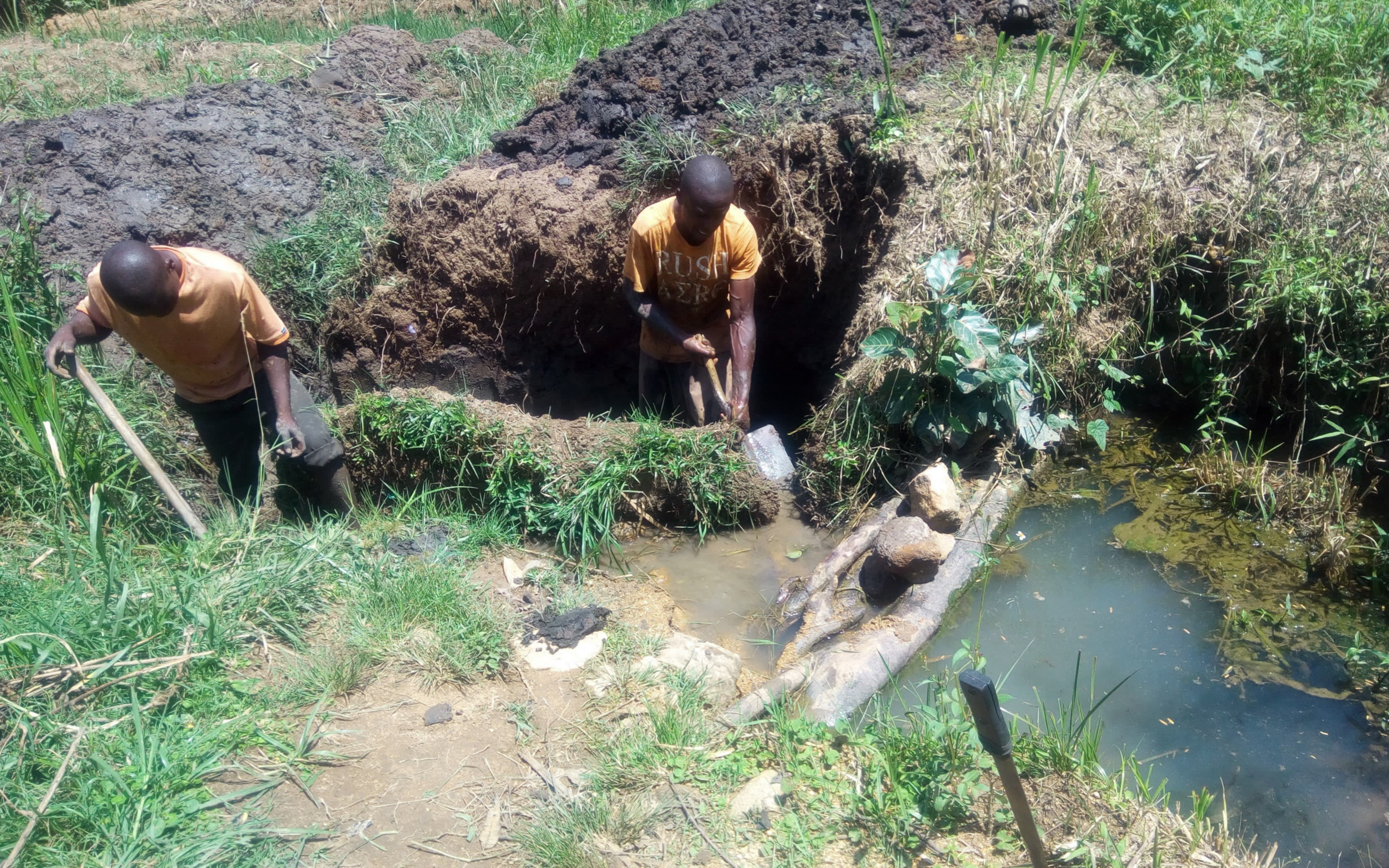This project is a part of our shared program with Western Water and Sanitation Forum (WEWASAFO). Our team is pleased to directly share the below report (edited for clarity, as needed):
When you watch Kenyan television and read the news of how people from the northeast are dying because of water shortage because of our severe dry season, it burdens my heart. Moving down to our western province, people have water. But they are suffering as a result of consuming lots of unclean and unsafe water that is always available. We have taken up the challenge to protect springs, ensuring people have access to clean and safe drinking water.
Welcome to the Community
The major economic activity in Lutali Community is planting sugarcane. But in this community, women are primarily responsible for hard work on their sugarcane plantations. This community culture directs any earnings straight to the husband, and every time their wives harvest the crop, the husbands often disappear for a period of time and procure a second wife. This often leaves the first wife in poverty.
Women here wake up early to undertake morning activities that include going to fetch water from the spring, preparing the children to go to school, and weeding and planting the sugarcane.
Water Situation
Lukoye Spring serves 385 people from 55 different households. The water is used for purposes like drinking, cooking, washing, and watering. During the dry months when it doesn't rain, farmers use this water for their sugarcane and other vegetables.
Beneficiaries also report that Lukoye Spring gets terribly crowded during these dry months. Not only do farmers need to draw extra water for their farms, but people from other villages make the long walk to Lukoye Spring. While their water sources dry up, Lukoye Spring keeps flowing with water.
Though there is plenty of water at Lukoye Spring, the water is not fit for consumption. It is open to contaminants that are carried by wild animals, rainwater, and even the containers that people dunk in the water.
After drinking this water, people suffer from waterborne diseases like typhoid.
Sanitation Situation
The standards of sanitation and hygiene here are quite wanting, as most of the people lack proper latrines, bathing rooms, clotheslines and dish racks. The latrines observed are poorly constructed and pose danger to their users. For example, the floors over the pit are wearing away and could collapse at any moment. It is not uncommon to hear stories of how a person fell through the floor to injury or death. Because of these poor conditions, people prefer to relieve themselves in the privacy of bushes. Leaving their waste in the open like this jeopardizes the health of the rest of the community, as waste is easily spread by flies and other wild animals.
There were only a couple of containers found outside of latrines that are used for hand-washing. Nobody we spoke with was able to explain the importance of having a hand-washing station or when to use it.
Plans: Hygiene and Sanitation Training
Community members will attend hygiene and sanitation training for at least three days. This training will ensure participants are no longer ignorant about healthy practices and their importance. The facilitator plans to use PHAST (Participatory Hygiene and Sanitation Transformation), CLTS (Community-Led Total Sanitation), ABCD (Asset-Based Community Development), group discussions, handouts, and demonstrations at the spring.
Training will also result in the formation of a committee that will oversee operations and maintenance at the spring. They will enforce proper behavior around the spring and delegate tasks that will help preserve the site, such as building a fence and digging proper drainage.
Plans: Sanitation Platforms
On the final day of training, participants will select five families that should benefit from new latrine floors.
Training will also inform the community and selected families on what they need to contribute to make this project a success. They must mobilize locally available materials, such as bricks, clean sand, hardcore, and ballast. The five families must prepare by sinking a pit for the sanitation platforms to be placed over. All community members must work together to make sure that accommodations and food are always provided for the work teams.
Plans: Spring Protection
Mr. Lukoye is the landowner whom the spring is named after. He said, "Poverty is indeed a thorn in our flesh, and thus without proper assistance from well wishers like you, people die premature deaths before they accomplish their goals in life. People in this community have suffered for a long time due to lack of clean and safe water, their health has really deteriorated leading to underdevelopment in the area."
Protecting the spring will ensure that its water is safe, adequate and secure. Construction will keep surface runoff and other contaminants out of the water. Fetching water is predominantly a female role, done by both women and young girls. Protecting the spring and offering training and support will therefore help empower the female members of the community by giving them more time and efforts to engage and invest in income-generating activities.

 Protected Spring
Protected Spring
 Rehabilitation Project
Rehabilitation Project






































